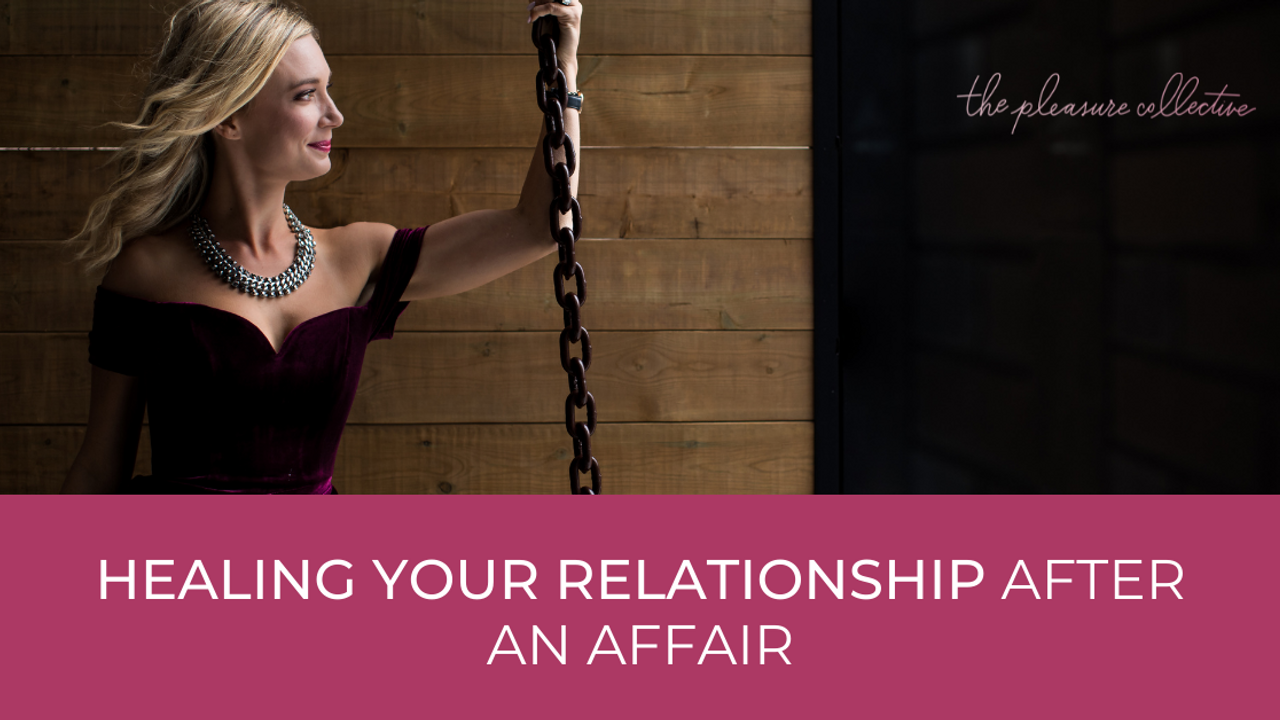The Process of Healing Your Relationship After an Affair

While it is considered a taboo topic, we need to open up the conversation about affairs and infidelity.
Esther Perel calls infidelity “universally forbidden yet universally practiced” which perfectly characterizes how society views and experiences cheating in relationships. While each person whose partner has had an affair may feel lost and alone, they are far from alone in this experience. And a lot of that feeling of loneliness comes from shame and refusal of women and society to talk about it.
There is an overwhelmingly common narrative in society that when one partner in a relationship has an affair, it’s the woman’s fault. As a result of these harmful narratives and the associated feelings of shame, women don’t feel safe to talk about it.
When there is infidelity in a relationship, women are often left asking themselves:
- What did I do wrong?
- What wasn’t I bringing to the relationship?
- What wasn’t I providing to my partner?
Essentially, women are often left feeling like the affair is their own personal failure.
First and foremost, it’s important to address that there are many reasons why infidelity happens in relationships and none of these reasons are a personal failure. In fact, society has set us up to believe that it’s more acceptable for a man to cheat in a relationship and that the blame falls on the woman. This of course is not true.
One of the factors that leads to infidelity is incorrect sex education. Our societal perception of sex is based on the male sexual response -- the institanious desire. Women, however, aren’t being educated about their bodies and that lack of education paired with the societal perception of sex often leads to women’s needs not being met in the bedroom. When a woman’s needs aren’t being met in the bedroom, a lack of desire to continue having sex will follow. Because of this, the woman often thinks that there’s something wrong with her. In reality, there’s actually something wrong with society as a whole in our culture. And can we really blame women for not wanting bad sex?
What does cheating mean to you?
The term “cheating” will mean something different to everyone. Even individually, our idea of cheating will often change and become more fluid as we age and evolve in our relationships.
Some people may consider specific things like watching porn, sexting someone, kissing someone, etc. cheating, which will differ for each person and each relationship. At the end of the day, the definition of cheating truly stems from dishonesty and lack of integrity. Our personal boundaries are the deciding factor.
For example, in a relationship where one partner has a significantly higher drive than the other, porn watching and masturbation may be welcomed and celebrated. While in another relationship this may be communicated as something that’s not accepted. What’s important with each of these relationships, is that it needs to be communicated between partners and agreed upon. Breaking that agreement and that trust is where the line for cheating is crossed.
Regardless of your relationship structure, once infidelity has happened and the trust has been breached… How do you begin to heal?
Ways to build trust and commitment and to support healing after an affair
Healing after an affair won’t begin until you take a massive look at the underlying causes of the infidelity. A large percentage of the time, there are very clear underlying issues like beliefs about sex, knowing what you want, asking for it, etc. It’s also immensely important to process those feelings of shame and lean on your community; Finding a safe space in sisterhood or through professional support to be vulnerable to open up and talk about it.
At the end of the day, healing will be different for everyone. In addition to the above, here are a few more ways to build trust and support healing after an affair (we get into these in more detail on episode 21 of The Pleasure Principles on Apple or Spotify).
- Partners should always talk through what's happening so both can feel free and not threatened.
- Create agreements to stay in touch and communicate when a partner needs it.
- Communication is essential - establish and communicate boundaries about what you are ok to hear.
- Don’t assume that someone sees monogamy the same way you do. Talk about this with each other and establish what it means to you.
- Take responsibility for our own desires and learn about your body so you know what to ask for in the bedroom.
- Think about why you haven't wanted sex to face the issues that you haven't been facing.
- Begin the process of healing the feelings of inadequacy in the bedroom through proper sex education and healing your relationship with your body.
- Sharing in sisterhood with people you can trust to help combat feelings of shame.
- Choose to let the experience teach you something about you, your partner and your desires.
With the right support, we can heal from infidelity once we grow and become more of us than we were before.
For more insights on factors that are contributing to affairs, tackling infidelity, and ways to build trust and commitment and to support healing, listen to episode #21 of The Pleasure Principles on Apple or Spotify.
The Pleasure Principles Program - Taking you from too tired to turned on in 12 transformational weeks.
The Feminine Mentorship - Become the Feminine Force you were meant to be before society, expectations, and "superwoman" conditioning got in the way over 12 months.
The Pink Canary - The Hidden Secret to Optimum Health for Women by Jordin Wiggins.
Information has been taken from The Pink Canary: The Hidden Secret to Optimum Health for Women by Jordin Wiggins.


